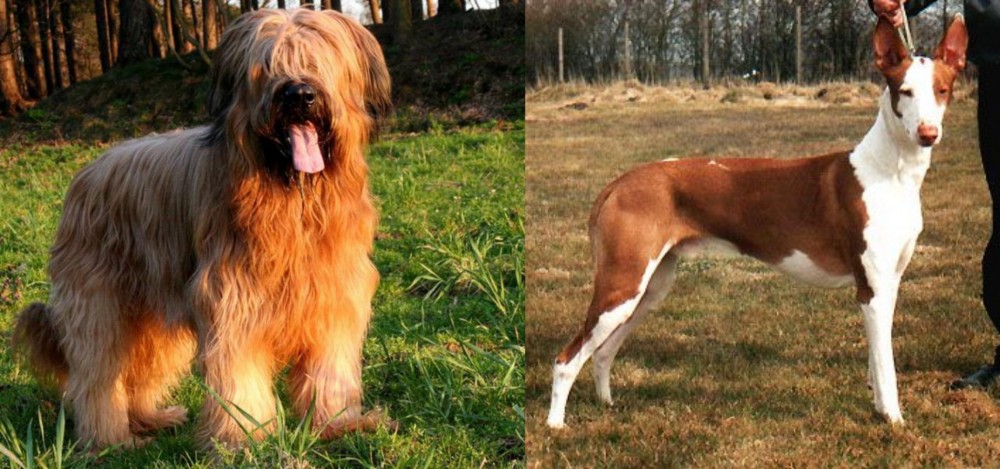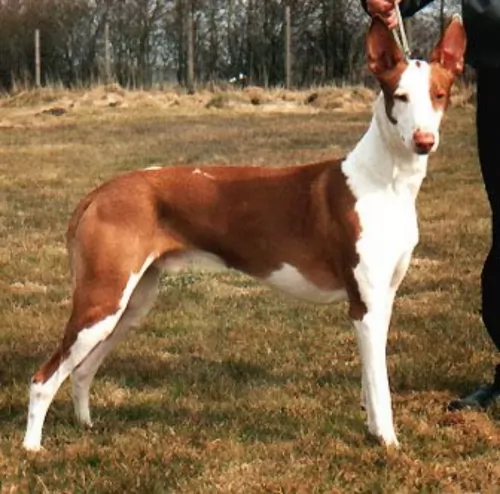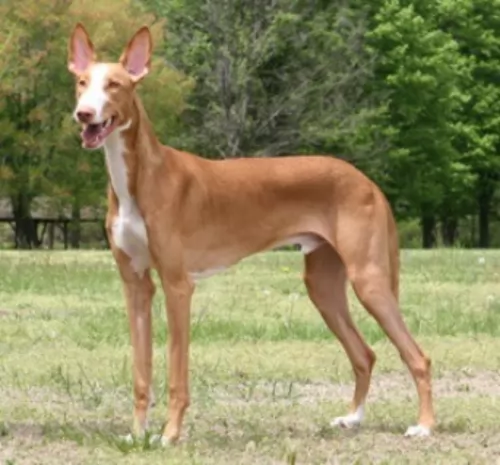 Petzlover
Petzlover Briard is originated from France but Podenco Canario is originated from Spain. Both Briard and Podenco Canario are having almost same height. Briard may weigh 15 kg / 34 pounds more than Podenco Canario. Both Briard and Podenco Canario has almost same life span. Both Briard and Podenco Canario has almost same litter size. Briard requires High Maintenance. But Podenco Canario requires Low Maintenance
Briard is originated from France but Podenco Canario is originated from Spain. Both Briard and Podenco Canario are having almost same height. Briard may weigh 15 kg / 34 pounds more than Podenco Canario. Both Briard and Podenco Canario has almost same life span. Both Briard and Podenco Canario has almost same litter size. Briard requires High Maintenance. But Podenco Canario requires Low Maintenance
 Through myth and legend, the Briard is thought to be a very ancient dog. A French herding breed, a Briard type of dog appears in writings as early as the end of the 14th century. According to legends the Briard was owned by Napoleon, Charlemagne, Lafayette and Thomas Jefferson. As a cross between the Barbet and the Beauceron, the Briard came into popularity following its appearance in a Paris dog show in 1863. Bred originally to guard and herd sheep, these intelligent, independent dogs were often left on their own. Because they both guarded and herded, their size and structure as well as their personalities were different from other dogs that worked sheep. Those that herded only were fast, agile and smaller. Those that only guarded were heavier, bigger and stronger. The Briard was in-between these two types of breeds. He was well suited to any kind of farm work and guarded the crops from the sheep’s desire to eat them. They moved the sheep from one grazing area to another and then to their holding area at night. No humans had to assist the Briard in this work once they were trained.
Through myth and legend, the Briard is thought to be a very ancient dog. A French herding breed, a Briard type of dog appears in writings as early as the end of the 14th century. According to legends the Briard was owned by Napoleon, Charlemagne, Lafayette and Thomas Jefferson. As a cross between the Barbet and the Beauceron, the Briard came into popularity following its appearance in a Paris dog show in 1863. Bred originally to guard and herd sheep, these intelligent, independent dogs were often left on their own. Because they both guarded and herded, their size and structure as well as their personalities were different from other dogs that worked sheep. Those that herded only were fast, agile and smaller. Those that only guarded were heavier, bigger and stronger. The Briard was in-between these two types of breeds. He was well suited to any kind of farm work and guarded the crops from the sheep’s desire to eat them. They moved the sheep from one grazing area to another and then to their holding area at night. No humans had to assist the Briard in this work once they were trained.
During World War 1, the Briards were drafted into service as messengers, sentries and search dogs for lost or injured soldiers. In that time frame the breed served almost to the point of extinction. Breeding programs following the war brought them back. Today the Briard is a home companion, a police dog, as well as both military and civilian search and rescue dogs.
 The Podenco Canario comes from the Canary Islands (Spain) and is still used for hunting purposes to this day, although it is also becoming more of a companion dog.
The Podenco Canario comes from the Canary Islands (Spain) and is still used for hunting purposes to this day, although it is also becoming more of a companion dog.
It is believed that the dog descended from ancient dogs which were brought to the islands from Egypt and North Africa by early human settlers.
 The Briard is a powerful, intelligent and independent working dog. They have a straight topline and their height is almost the same as their length. They have long, large, rectangular heads with wide muzzles. Their noses are also square and jet black while their side set, large eyes can be black-brown or black. Their ears have traditionally been cropped but with more countries outlawing it, they can now have natural ears set high on the head. They have a tail that is feathered and low-cut. The feet of a Briard are round, compact and large.
The Briard is a powerful, intelligent and independent working dog. They have a straight topline and their height is almost the same as their length. They have long, large, rectangular heads with wide muzzles. Their noses are also square and jet black while their side set, large eyes can be black-brown or black. Their ears have traditionally been cropped but with more countries outlawing it, they can now have natural ears set high on the head. They have a tail that is feathered and low-cut. The feet of a Briard are round, compact and large.
The Briard is a double coated breed with a long beard and mustache. Their hair completely covers the head and the eyes so that they are not seen. They have prominent eyebrows as well.
 The Podenco Canario is a medium sized dog and stands at between 55 and 64cm and weighs between 20 and 25kg. This is a slender, muscular dog but still robust and sturdy. There are in fact 2 sizes of Podenco Canarios – one is the medium sized dog of up to 64cm and the other is a smaller size.
The Podenco Canario is a medium sized dog and stands at between 55 and 64cm and weighs between 20 and 25kg. This is a slender, muscular dog but still robust and sturdy. There are in fact 2 sizes of Podenco Canarios – one is the medium sized dog of up to 64cm and the other is a smaller size.
The coat of the dog is short and smooth and is a rich red color or even chocolate brown. There are dogs which can have some white markings. The dog's nose and skin should be a shade of red and these dogs are known to blush when they become animated. The neck of the dog is long with the head being long and slender too, with the large bat-like ears being erect.
This dog can become very attached to his human family and is somewhat reserved around strangers. He is smart and will be able to learn easily. Training and socialization will be necessary to him as it makes him balanced and obedient.
He will appreciate a firm, consistent, kind owner as he is a dog that is strong willed and stubborn. He is a gentle dog too and can play well with children who have been taught to treat dogs with respect. He is active and will require a good deal of daily exercise.
 As mentioned previously the Briard is intelligent and independent. They are also loyal, rugged, protective and bond intensely with their humans. They are often aloof when it comes to strangers or even when new furniture is introduced into the household. They have to learn that anything new into the family environment is friendly and good. They are great with children and susceptible to separation anxiety because of their deep affection for their people. Socialization for puppies is a must. This will let them know that people and children, other dogs in general are not harmful to their families. They have great memories and once they learn something – right or wrong – it is almost impossible to change it. They were bred to be independent thinkers who acted on their own conclusions. This is still true of the breed today, making them appear to be stubborn.
As mentioned previously the Briard is intelligent and independent. They are also loyal, rugged, protective and bond intensely with their humans. They are often aloof when it comes to strangers or even when new furniture is introduced into the household. They have to learn that anything new into the family environment is friendly and good. They are great with children and susceptible to separation anxiety because of their deep affection for their people. Socialization for puppies is a must. This will let them know that people and children, other dogs in general are not harmful to their families. They have great memories and once they learn something – right or wrong – it is almost impossible to change it. They were bred to be independent thinkers who acted on their own conclusions. This is still true of the breed today, making them appear to be stubborn.
They are great watchdogs, fearless and brave; willing to learn, eager to make you happy. They are basically gentle but that always runs up against their protective nature. A strong alpha leader is needed to handle this hard-working dog.
 The Podenco Canario is a quiet breed that isn’t going to cause you trouble as he just slots into your way of life.
The Podenco Canario is a quiet breed that isn’t going to cause you trouble as he just slots into your way of life.
He is easy going, gentle and smart and wants to please. He is also a low maintenance dog, easy to please if he benefits from a good dose of exercise and human interaction.
Early socialization and training is important, as with any other dog breed, and then he becomes an excellent pet and friend of the family.
 Being a large breed, the Briard shares many of the same health concerns as other large breeds. They have a few of their own as well. Typical issues for a Briard might include:
Being a large breed, the Briard shares many of the same health concerns as other large breeds. They have a few of their own as well. Typical issues for a Briard might include:
Progressive Retinal Atrophy/Degeneration –degeneration of the photoreceptors and retina.
 Your Podenco can live to be 10, 11 or 12 years of age if looked after well. Because he is a primitive breed, he is able to throw off some diseases that other dogs might battle with. Just like with other dogs however, he can battle with some health problems. One of two of the common dog illnesses to watch out for include -
Your Podenco can live to be 10, 11 or 12 years of age if looked after well. Because he is a primitive breed, he is able to throw off some diseases that other dogs might battle with. Just like with other dogs however, he can battle with some health problems. One of two of the common dog illnesses to watch out for include -
Skin problems can create havoc for your dog. They can be frustrating, painful and itchy. Skin problems can come from parasites, allergies and skin infections. Common parasites that involve the skin include ticks and fleas and mites. Dogs themselves can also cause irritation of the skin by licking one area over and over again from sheer boredom and stress.
To prevent this life threatening disease, try and feed your dog 2 meals a day instead of one so that he doesn't gobble his food up. This can contribute to bloat. The stomach fills with gas and the stomach can twist and bring death to the dog. Get your dog to the vet immediately if you see he is restless,drooling and has a swollen stomach.
This is particularly worrisome if you live in an area where there are lots of mosquitoes. Heartworm infections can be deadly for your dog. Speak to your vet about preventative treatment if you are traveling to an area known for its mosquito problems..
 It is best to feed the Briard smaller meals 2-3 times a day to prevent bloat. Feed 3-4 cups total for the day of a dry dog food that is high quality and made for large breeds.
It is best to feed the Briard smaller meals 2-3 times a day to prevent bloat. Feed 3-4 cups total for the day of a dry dog food that is high quality and made for large breeds.
Stationary Night Blindness – Congenital limited vision in the dark can vary from slight difficulty moving to complete inability to see in the dark.
Progressive Retinal Atrophy/Degeneration – Can lead to night blindness, limited or total blindness. Puppies with the disease can be blind before their first birthday.
Bloat (Gastric Torsion) – Stomach is distended and twists. Fatal if not treated quickly. Caused by eating a large meal quickly and either exercise immediately or drink a large amount of water right after eating.
Von Willebrand’s Disease – Blood clotting disorder leads to excessive bleeding. There is no cure, but it is manageable.
The Briard is a working dog and as such needs a job. They excel at agility, flyball, herding, obedience, confirmation and tracking. They need exercise and make excellent service dogs for people with disabilities and therapy dogs for those in emotional need.
 Provide your dog with a daily dose of exercise. He will love to have a walk with you every day but ball games will also be important for him.
Provide your dog with a daily dose of exercise. He will love to have a walk with you every day but ball games will also be important for him.
Your Podenco Canario is a medium-breed dog, with a slim, muscular build To keep him that way, ensure he has a high quality commercially manufactured dog food that is high in the vitamins and minerals he needs.
Dry kibble needs to be enhanced with some home-made food. Boiled chicken, brown rice, sweet potatoes, carrots and spinach are excellent when chopped up and added occasionally to the dry kibble. You can also include some raw meat into his food from time to time. Such nutritious food which is simple, can help your dog live a long, healthy, happy life.
Your dog has a short coat and a brush twice a week will keep it in tip top condition. Make use of these brushing sessions to check your dog’s coat for fleas and ticks. Also check him over for any new lumps. Cancer is an ever present threat with dogs.
Look inside his ears for any signs of redness, and try and look inside his mouth too for signs of bad teeth. His nails should also be kept short and trimmed. If they get too long they can hook onto things and rip the flesh open.